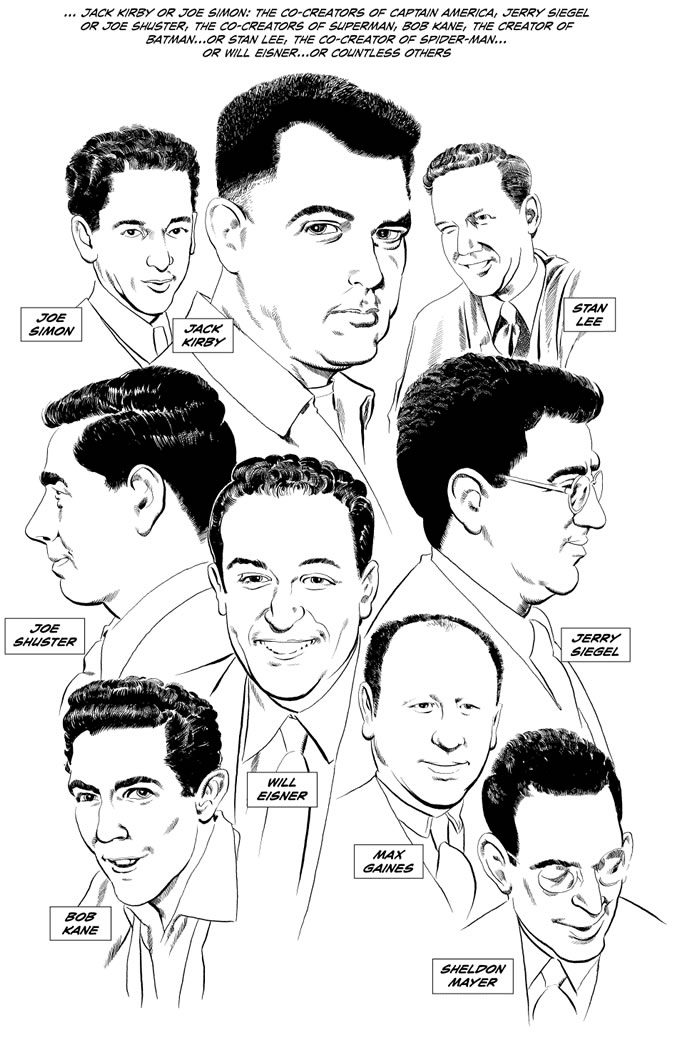 |
| Judenhass (2008) Art by Dave Sim |
(from Comics International #207, 2008)
Literally translated as "Jew Hatred", Judenhass' release coincides with the 60th Anniversary of the founding of the state of Israel. On the dedicated website, Sim writes, “I decided some time ago that the term Anti-Semitism… is completely inadequate to the abhorrent cultural phenomenon which it attempts to describe… It seemed to me that the term [Judenhass] served to distil the ancient problem to its essence, and in such a way as to hopefully allow other non-Jews (like myself) to see the problem “unlaundered” and through fresh eyes. Europe and various other jurisdictions aren’t experiencing a sudden upsurge in “Anti-Semitism”. What they are experiencing is an upsurge in Judenhass.”
The pages depicting the Holocaust or Shoah – the bleak barracks of Auschwitz in their full, freezing horror, and the gaunt faces of their skeletal occupants crammed onto stacks of hard, wooden racks – are accompanied by a calm, considered explanation of why Sim believes that every creative person should consider embarking on such a work, particularly those who aren’t Jewish:
““Lest we forget”… “Never again”… are fine and noble-sounding sentiments which have attached themselves to the historical remembrance of what was done to these innocent individuals and millions of others like them. But it seems to me that the words are largely meaningless if (as has been the case to now) in movies, in books, in plays and in documents of the historical record they are expressions largely if not exclusively being enunciated by Jews. If there is a chance of systemic Jew Hatred being eliminated from our society, it can’t just be Jews who speak out against it.”
Some things bear repeating, because some things do not bear being repeated.
He also points out that but for “geographical happenstance” the comicbook field “created, developed and built primarily by Jews, painstakingly, one comicbook at a time” could have lost Joe Simon, Jack Kirby, Stan Lee, Joe Shuster, Jerry Siegel, Will Eisner, Bob Kane, Max Gaines or Sheldon Mayer.
That’s precisely what Joe Kubert set out to explore in Yossel, published in 2003. Joe moved to America with his Jewish parents and sister when he was only a couple of months old, despite them being rebuffed earlier when his mother was pregnant. In Yossel, Joe puts himself in the place of a boy who hadn’t left Poland before its Nazi occupation. What follows is forced evacuation, incarceration, starvation and a systematic deprivation of comforts, communication, heating and clothes – a freezing endurance test without either hope or respite – and then it gets worse.
Kubert was one of the select few sent early copies of Judenhass and who have lined up to praise it, including Jean Shuster Peavy (Joe Shuster’s sister) and Marv Wolfman. Neil Gaiman wrote: “Judenhass is an astonishing piece of work. Painful and real and unflinching. I don't remember the last comic I read that made me cry, but this did." Indeed visitors to the Judenhass website should be warned, if only for parental guidance, that the animated introduction with its haunting soundtrack and terrible, echoing cracks of gunfire is as profoundly harrowing as the on-site preview.
The website also acts as a compendium to the comic, providing background research, some shockingly Anti-Semitic screeds from unexpected sources, and essays on the production process. In one of those Sim talks about the effect his detailed portraiture had on himself:
"At least temporarily I was able to individualize the victims for myself, personally, to differentiate each one as much as possible back into the individual he or she had been before the catastrophe of the Shoah had overtaken him or her."
"My people did this. That is, all of these individual Jews, all of these individual human beings, none of them very old, most in the prime of life came to the state in which I was capturing their likenesses through the actions of the non-Jews like myself. To set myself the task of capturing likenesses and expressions meant that I couldn't look away or see the Shoah through distanced overview, impersonally. How could I? Each death had been experienced personally, each death had been individual, each death had ended in a final eloquent...and horrific... expression. The only thing to me more horrific than those final expressions was the all-too-human urge to look away."
"How dare I? How dare any of us?"
Stephen Holland is the co-founder (with Mark Simpson) of one the UK's leading comic stores - Page 45.
No comments:
Post a Comment